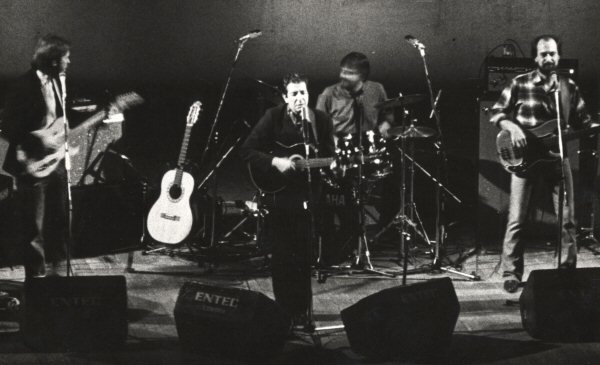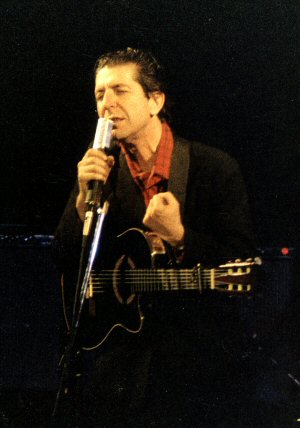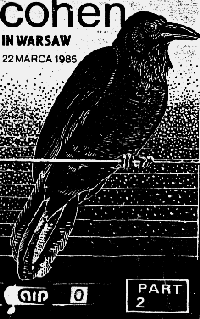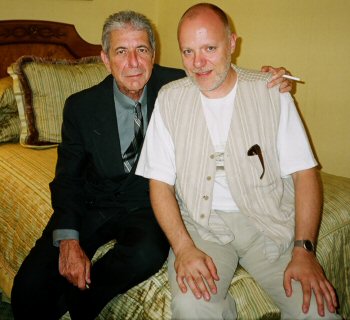by Daniel Wyszogrodzki March 22, 1985, Sala Kongresowa (Congress Hall at the Palace of Culture)Leonard Cohen´s trip to Poland in 1985 was as much welcomed as it was unexpected. Not included in the original schedule for the Various Positions Tour the four March dates were added at the last minute thanks to promoter Andrzej Marzec – the first independent promoter in Poland (responsible for bringing Bob Dylan in 1994 and still active in the music business). It was a thrill for a number of reasons. First of all PRL (Polish People’s Republic, as the state was called while under a Soviet regime) was not a concertgoer’s heaven. Quite the opposite. Foreign stars of popular music did not visit our country on regular basis and the memory of The Rolling Stones show in 1967 never seemed to fade. Another important thing: it was a sad and very dark period in our contemporary history. A martial law imposed on 13th of December 1981, only a year after an outbreak of “Solidarity” (the first semi-free trade union in the Eastern Block and also a major social movement) has deepened the economical and spiritual crisis in our country and it seemed there were no realistic solutions at hand. It was generally believed the Soviet Union would invade the country – as it did in Hungary in 1956 and in Czechoslovakia in 1968 – at the first sign of a real uprising. The spirits hit the bottom. But the main reason was the artist himself. Leonard Cohen was a cult figure by that time, considered the greatest living songwriter, widely recognized and loved by the Poles as no other singer in the world. He was known to be a writer as well, although none of his works were available in Polish translations. His songs were sung with the Polish lyrics by Maciej Zembaty. I never liked his translations, but I recognize his role in making Leonard Cohen a household name in Poland. You would hear “Suzanne” at every campfire in the country. This is no place for literary analysis, but our appreciation of Leonard Cohen’s songs is easy to explain. We understood them. When he spoke about Suzanne or about Jesus we felt his lyrics sound familiar, strike familiar bells. His poetry seemed to be a distant branch of the ages old tree of European literature. We dug the metaphors. He seemed – with all his originality – not unlike our own poets. Exotic – yes. Especially in his unorthodox treatment of sex and religion. But understandable. As opposed to the “Americana” of Bob Dylan or Bruce Springsteen. All this added to the enormous interest in Leonard Cohen’s shows in Poland. There were four of them. Beside the Warsaw concert I joyfully attended (and recorded and took photographs of) there was a famous show in Wroclaw’s Hala Ludowa (Jahrhunderthalle in German) where Hitler addressed the crowds of his Nazi followers in the 30's. Leonard Cohen made a comment on that and performing in the place of such a history gave him a very spooky feeling. His latest album – “Various Positions” – came out few months before and Dance Me To The End Of Love was a major hit both on the radio and as the music video played continuously on Polish national television. Needless to say obtaining a ticket was a problem and it had nothing to do with a very high price (at the day of the show scalpers would get an equivalent of a monthly salary for a single ticket and people still considered themselves lucky to get in). In front of the SPATIF office in downtown Warsaw (a central box-office for all entertainment tickets) a line formed with a week’s advance. It was controlled by me and my friends from a car parked in front of the office day and night. Anyone interested would get a number – without it there was no way of getting inside after the tickets arrived. Mine was number 2 (because a friend I brought with me got to the door before me and signed his name first). People may still remember a very red Peugeot 305 with a cover of “Songs of Leonard Cohen” (a vinyl copy since the CDs just started to appear at that time) stuck behind a windshield – headquarters of the Unofficial Ticket Committee. More then a thousand people signed up! The communist authorities were ambivalent. The tourneé of Leonard Cohen in Poland was officially approved of – otherwise it would never happen. But it would only get the coverage from a local TV channels like Kurier Warszawski (a Warsaw Courier) in the capitol where a young blond journalist, Grazyna Bukowska, interviewed the artist every day during his visit. Unfortunately, a VHS tape of these interviews I recorded of the television, was later accidentally erased. As far as I know – and I spoke to Mrs. Bukowska recently – nothing remains in the archives. Luckily – there’s a video tape of the entire Warsaw concert itself. I remember when Mr. Cohen heard a woman filmed by a TV crew in front of Kongresowa at the day of the show confess she spent her monthly salary on a single ticket. He said she shouldn’t have done so. In the studio he seemed really disturbed and said it wasn’t worth it. Waiting for the concert was like waiting for a volcano to erupt. A funny feeling concerning how quiet and tranquil Cohen’s shows are. I knew basically what to expect. Although there was no bootleg material available and we had to be satisfied with the “Live Songs” album (quite satisfying I still say) I knew what to expect, cause I just got a tape of his Paris shows. Another thing was a friendly welcome. And here comes my “WELCOME BACK sign story”:  The sign – when spread wide – said: WELCOME BACK. Neither imaginative nor appropriate, wouldn’t you say? Well, not necessarily. For the idea was to fold it. When Leonard Cohen entered the stage for the first time, we had the BACK part folded and shown only a friendly WELCOME. I swear he noticed – we had excellent seats at the first row of the amphitheater (best seats in the house, take my word on that) and the sign was huge. When Mr. Cohen left the stage for the intermission it was a humble COME BACK letting him know we’ll be patiently waiting. Needless to say, when he showed up again for the second part of the show, we had the triumphant WELCOME BACK waiting and he seemed slightly confused… Or maybe it was just our imagination overcoming our sign holders’ pride. I wonder if he remembers it at all. As you should guess by now the encores (Tennessee Waltz and the second performance of Bird On A Wire that never made it to the tape of the show and hence to the bootleg album) had us waving: COME BACK, WELCOME BACK, COME BACK, WELCOME BACK, COME BACK… I suppose doing a trick like this today would get me and my friends all over the news. Back then there was no Polish TV present at the show and almost no journalists (we attended the show privately smuggling our cameras and recording devices). A friend of ours – his name was Lelek and I have no idea where he is now – noticed our gang from a high balcony seat and taking one shot he got left in the camera memorized the moment and the sign. And an evening of hope and beauty I shall never forget. I am that young guy right above the “O” (25 years old back then), the Mickey Mouse hair at my right belongs to Tomek Nowak, a lifelong friend and one of today’s top Polish copywriters in advertisement business. Our girlfriends both bent down to pickup their purses. It is the very moment the lights went back on.
We didn’t realize then he was under different kind of pressure at the very same time. His band didn’t want any troubles. They came to play the music and get paid for doing it. They didn’t want anything to interrupt the tour. They had come from very safe Sweden and were on their way to very safe Italy. Poland was a “side job”. And they were all professionals.
Now, more then 20 years after the Warsaw concert, I am proud to be the Polish translator of the „Book of Longing”. It came out in Poland in November 2006. Thank you, Teacher.
|
![[PREV PAGE]](but-prev.gif)
![[NEXT PAGE]](but-next.gif)
![[INDEX PAGE]](but-ndx.gif)
![[SUB INDEX PAGE]](but-subi.gif)


